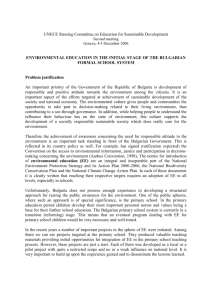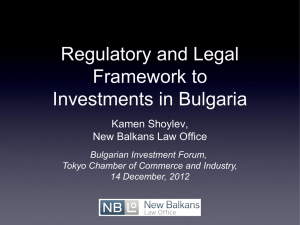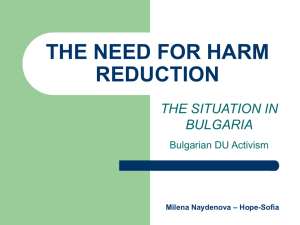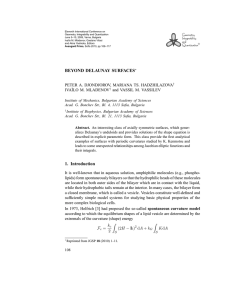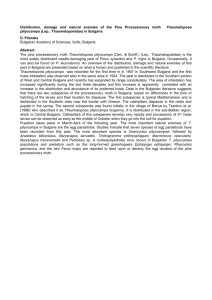Answers from the Republic of Bulgaria
advertisement
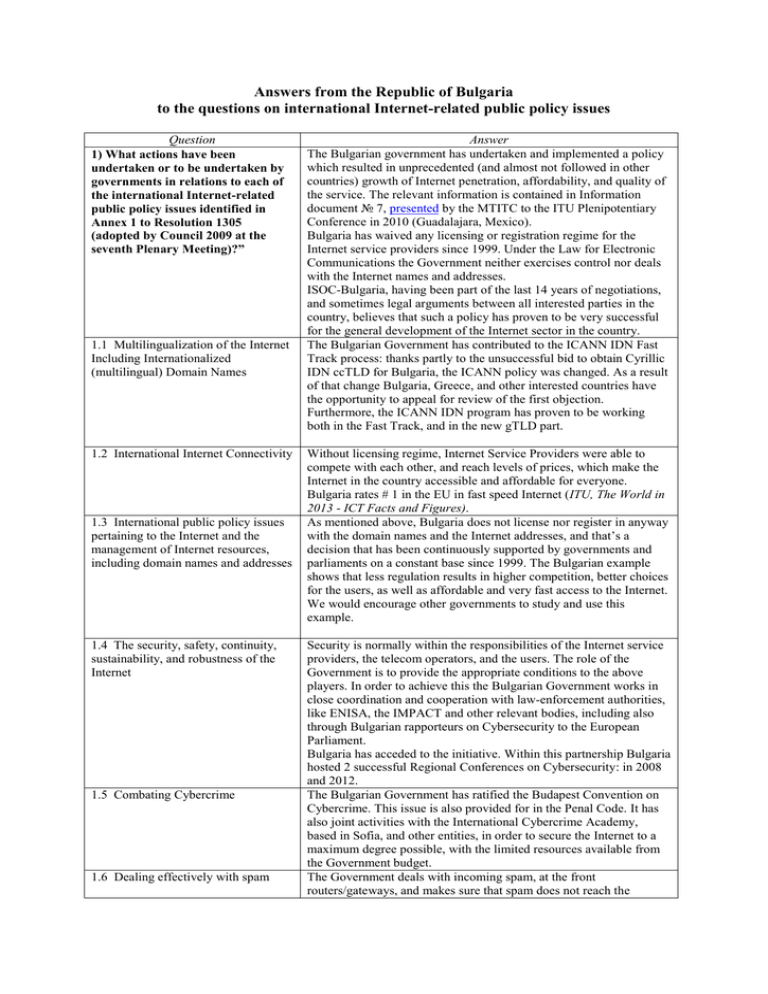
Answers from the Republic of Bulgaria to the questions on international Internet-related public policy issues Question 1) What actions have been undertaken or to be undertaken by governments in relations to each of the international Internet-related public policy issues identified in Annex 1 to Resolution 1305 (adopted by Council 2009 at the seventh Plenary Meeting)?” 1.1 Multilingualization of the Internet Including Internationalized (multilingual) Domain Names 1.2 International Internet Connectivity 1.3 International public policy issues pertaining to the Internet and the management of Internet resources, including domain names and addresses 1.4 The security, safety, continuity, sustainability, and robustness of the Internet 1.5 Combating Cybercrime 1.6 Dealing effectively with spam Answer The Bulgarian government has undertaken and implemented a policy which resulted in unprecedented (and almost not followed in other countries) growth of Internet penetration, affordability, and quality of the service. The relevant information is contained in Information document № 7, presented by the MTITC to the ITU Plenipotentiary Conference in 2010 (Guadalajara, Mexico). Bulgaria has waived any licensing or registration regime for the Internet service providers since 1999. Under the Law for Electronic Communications the Government neither exercises control nor deals with the Internet names and addresses. ISOC-Bulgaria, having been part of the last 14 years of negotiations, and sometimes legal arguments between all interested parties in the country, believes that such a policy has proven to be very successful for the general development of the Internet sector in the country. The Bulgarian Government has contributed to the ICANN IDN Fast Track process: thanks partly to the unsuccessful bid to obtain Cyrillic IDN ccTLD for Bulgaria, the ICANN policy was changed. As a result of that change Bulgaria, Greece, and other interested countries have the opportunity to appeal for review of the first objection. Furthermore, the ICANN IDN program has proven to be working both in the Fast Track, and in the new gTLD part. Without licensing regime, Internet Service Providers were able to compete with each other, and reach levels of prices, which make the Internet in the country accessible and affordable for everyone. Bulgaria rates # 1 in the EU in fast speed Internet (ITU, The World in 2013 - ICT Facts and Figures). As mentioned above, Bulgaria does not license nor register in anyway with the domain names and the Internet addresses, and that’s a decision that has been continuously supported by governments and parliaments on a constant base since 1999. The Bulgarian example shows that less regulation results in higher competition, better choices for the users, as well as affordable and very fast access to the Internet. We would encourage other governments to study and use this example. Security is normally within the responsibilities of the Internet service providers, the telecom operators, and the users. The role of the Government is to provide the appropriate conditions to the above players. In order to achieve this the Bulgarian Government works in close coordination and cooperation with law-enforcement authorities, like ENISA, the IMPACT and other relevant bodies, including also through Bulgarian rapporteurs on Cybersecurity to the European Parliament. Bulgaria has acceded to the initiative. Within this partnership Bulgaria hosted 2 successful Regional Conferences on Cybersecurity: in 2008 and 2012. The Bulgarian Government has ratified the Budapest Convention on Cybercrime. This issue is also provided for in the Penal Code. It has also joint activities with the International Cybercrime Academy, based in Sofia, and other entities, in order to secure the Internet to a maximum degree possible, with the limited resources available from the Government budget. The Government deals with incoming spam, at the front routers/gateways, and makes sure that spam does not reach the mailbox of users. Historically, commercial operators have proven quite good in dealing effectively with spam. In the course of the recent couple of years the volume of spam in Bulgaria has decreased by more than 20%. The Bulgarian share in the global spam stream is 0.76%. 1.7 Issues pertaining to the use and misuse of the Internet 1.8 Availability, affordability, reliability, and quality of service, especially in the developing world 1.9 Contributing to capacity building for Internet governance in developing countries 1.10 Developmental aspects of the Internet 1.11 Respect for privacy and the protection of personal information and data 1.12 Protecting children and young people from abuse and exploitation 2) What is the ITU’s role to support governments in their activities around Internet-related public policy issues? 3) Which international organizations/forums are the most adequate to receive support from the governments on the Internetrelated public policy issues? This issue is provided for in the Penal Code and falls within the competence of the Ministry of Interior Nowadays in Bulgaria there are more than 600 enterprises on the broadband services market, which is the necessary prerequisite for availability, affordability, reliability, and quality of service. As already mentioned above, this is an area where Bulgaria has positive achievements and its experience should be widely shared, including with the help of the ITU. We are not sure what this means – Internet governance would not need capacity building and contributions, it is more into the line of a Government to provide the appropriate conditions for competition. Likewise, we are not sure what it means In Bulgaria the respect for privacy and the protection of personal information and data are regulated by the Law on Protection of Personal Data, adopted in 2002, the Law on Electronic Communications and the Law for Civil Registration. The Commission for Personal Data Protection was established under the Law on Protection of Personal Data. It is an independent public authority whose main task is the protection of individuals when processing their personal data and providing access to these data. It also exercises control over observance of the Law on Protection of Personal Data and the other relevant laws and legislation acts. Within the context of the EC initiative, the Safer Internet Programme, a National Safer Internet Center has been established in Bulgaria since 2005. The main purpose of the Center is to educate children, teachers and parents, thus providing them with a safer, more useful and more pleasant cruise across the World Wide Web. The activities of the Center are assisted by a Public Council for Safer Internet, which includes representatives from all sectors of society: the Government, private sector, NGO’s, etc. One of the most active contributors to the activities of the Safer Internet Center is ISOC-Bulgaria. Internet-related public policy issues are within the sovereignty of each country which are also ITU member states. Therefore, it’s up to the member states to decide to what extent to involve various internetrelated organizations and co-operate with them. The most adequate organizations have been recognized by the ITU in the Internet resolutions from PP-10, and they are IETF, ICANN, ISOC, W3C, which provide their public forums several times a year. Also, the Internet Governance Forum should receive a more substantial support from governments.
